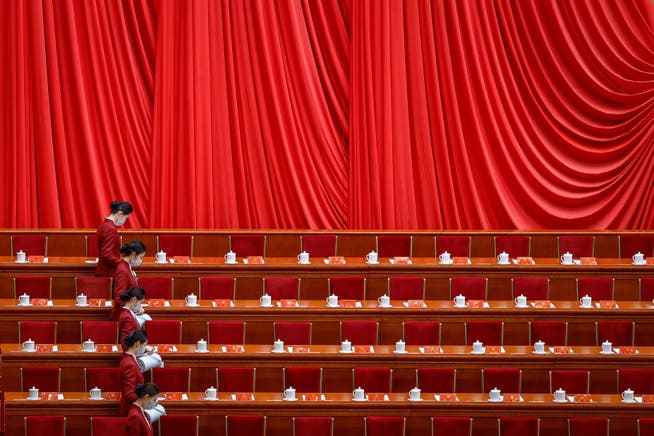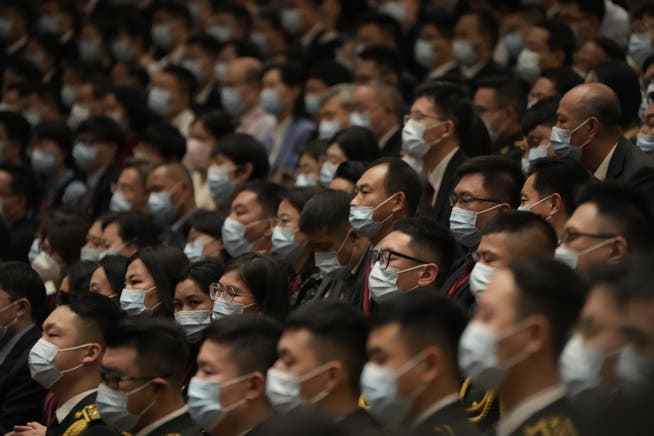Strictly guarded streets and bridges, increasing numbers of corona infections, canceled press events: the authorities in Beijing were very nervous during the 20th party congress of the CP.
Health workers in protective suits after a Covid outbreak in a residential area in Beijing on October 20.
The further east you drive on National Road 230 from Beijing, the thinner the traffic. Shortly before the city limits, where the Pinggu district of the Chinese capital meets the Jizhou enclave of the city of Tianjin, the road narrows into a winding track. It is now about three kilometers to the provincial border. People and cars are hardly to be seen.
Suddenly the cell phone reports the receipt of an SMS: One is about to leave the administrative region of Beijing. “Please observe the rules for combating pandemics,” says the message from the Beijing city administration. When entering the capital, those arriving have to be tested twice within three days. Participation in public events and visits to restaurants are prohibited during the first few days after arrival.
A few minutes later, the border post finally comes into view. Police officers are sitting in a massive, blue-painted building. They control all entering and exiting vehicles. Next door, in a long three-story building, troops of the armed People’s Police are housed.
The police warn those who want to cross the border into the urban area of Tianjin that there may be no way back to the capital.
A comprehensive security concept
The strict controls at the borders of the capital are just part of a comprehensive security concept that the government is using to protect Beijing while almost 2,300 delegates from the Communist Party hold their five-year party congress in the Great Hall of the People on Tiananmen Square. Deliveries from other provinces often arrive late in Beijing due to meticulous content checks. Police have posted everywhere at the major crossroads in the capital. The internet is working much slower than usual, presumably due to stricter censorship. Beijing is in a state of emergency.

Hostesses prepare drinks for delegates to the 20th National Party Congress of the Chinese Communist Party at the Great Hall of the People in Beijing.

Delegates wearing face masks during the opening ceremony of the party congress in Beijing.
The authorities are following the latest with particular nervousness increased number of corona infections. While the number of new infections every day was in the single digits for weeks, it is now back in the double digits. Beijing reported more than forty new infections on Tuesday, and many Beijing residents are in isolation.
The media office of the party congress promptly canceled all press trips. In the past few days, the organizers had organized a series of visits for accredited journalists, for example to the tech group Baidu or to a supplier of traditional Chinese medicine, Tongrentang. On Wednesday, the number of new infections fell slightly again.
A risky border crossing
For people like Zhang Dan, the controls at the city limits in particular cause considerable additional work. Zhang delivers groceries in Beijing. Now the short man with a long gray mane is standing with his battered van a few meters from the border to Tianjin in Beijing’s urban area. There are ten cartons of eggs on the truck bed. He took over the goods from a supplier half an hour earlier – on the other side of the border. Zhang had asked the border police if he could return to Beijing without any problems if he crossed the border. Zhang says: “They just said ‘maybe’.”
Zhang took the risk and drove a few hundred meters into the Tianjin area, received the eggs and turned back. All the necessary codes on his mobile phone flashed green, and the border guards let him through. A few weeks earlier, he had been stuck on the other side of the border for a day and night. Is the zero Covid policy reasonable? “It’s a matter of politics, I can’t change it,” says the man.
Travel to Beijing is possible these days, but extremely difficult due to the severe restrictions. On a sunny October afternoon, the spacious forecourt of Beijing Central Station is deserted and there are almost no travelers to be seen. A few men in orange suits are sweeping up waste in front of the entrance to the train station. The party congress delegates are just a stone’s throw away. On the station square, only two elderly men were discussing loudly whether the Beijing health app would also be accepted in Harbin, a city in northeast China. China’s controversial zero-Covid policy determines everyday life everywhere. In the background, a loudspeaker blares the regulations for entering the nearby subway station in an endless loop: keep a safe distance, carry the current corona test with you.
But the wasteland at Beijing’s central train station is heavily guarded. Two men in camouflage suits are standing on a pedestal, protected by a parasol. They are members of the armed People’s Police, machine guns at the ready. Right next to it, on a second pedestal, are two members of a Swat commando, a special police unit.
Far away from the everyday life of the citizens
There are oppressive scenes in these politically decisive days in Beijing. China’s ordinary people know little about the Communist Party Congress. The talks in the capital mainly revolve around the question of whether travel could become easier again after the end of the party congress.
Internationally, Beijing has once again come under criticism after members of the Chinese consulate in Manchester beat protesters at the beginning of the week. Scenes like this don’t really fit in with the image of a modern, cosmopolitan nation that the Chinese rulers like to paint.
For investors, the postponement of the release of the economic data for the third quarter indefinitely and without giving a reason is shaking their heads. The Hong Kong stock market has meanwhile plummeted. The actions of those in power in Beijing seem increasingly erratic, predictability is decreasing.
A lone protester made the Beijing security services particularly nervous. On Thursday last week, the man, believed to be from Northeast China, attached a banner to the railing of a pedestrian bridge over a busy city highway. «Freedom instead of lockdown, food instead of testing, respect instead of lies», were some of the slogans thereon. The man was arrested just minutes after his action.
今天上午北京四通桥上有人挂出了条幅,在社交媒体疯传。 pic.twitter.com/cTUBePKMGF
— Jingzhou Tao 陶景洲 (@JingzhouTao) October 13, 2022
Pictures and videos of this protest spread rapidly in China’s social networks. However, they were deleted almost as quickly by the authorities. For a short time, even the term “Beijing” was censored. Since this action, almost all Beijing pedestrian bridges have been guarded by uniformed and plainclothes officers.
According to the internet portal «China Digital Times» In the meantime, posters with the protest slogans of the Beijing “Bridge Man”, as the man is now known, have also appeared in other Chinese cities. Chinese students abroad also spread the slogans.
In the Great Hall of the People, where party leader Xi Jinping wants to present his new leadership team on Sunday, tension is likely to be high these days.
